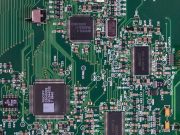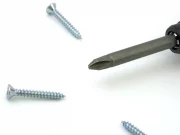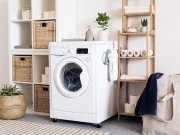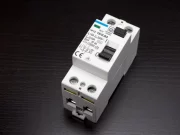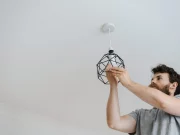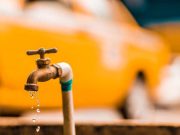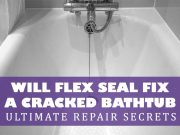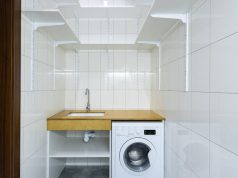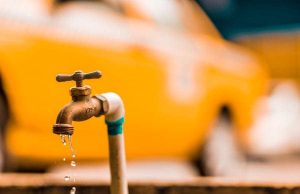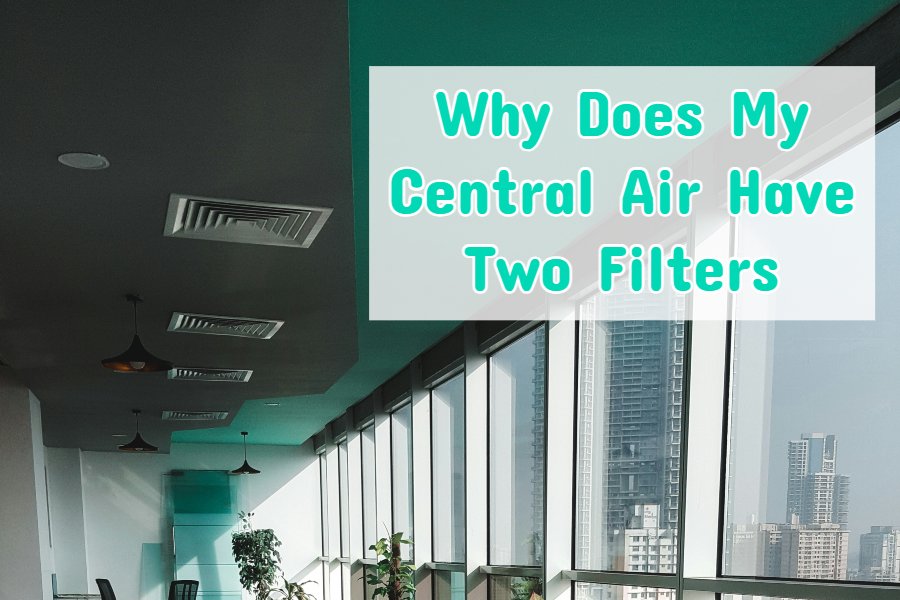
Your central air may have two filters due to separate intake locations or multi-zone systems. Managing air quality in different areas often requires multiple filtration points.
Understanding why your central air conditioning unit uses two filters is crucial for maintaining effective and efficient air quality control within your home. Central air systems are designed to circulate cool air throughout the house, and the presence of more than one filter serves to catch airborne particles and pollutants across distinct air intake locations.
This setup might also be a feature of sophisticated HVAC systems that provide zoned cooling, filtering air at various points to ensure consistent cleanliness and performance. It’s essential to regularly check and replace each filter to uphold a high indoor air quality standard and prevent undue stress on your air conditioning system. Keeping your living space free from dust, allergens, and other contaminants not only supports a healthier environment but also ensures your system operates at peak efficiency.
The Dual-filter Setup In Central Air Systems
Understanding the dual-filter setup in central air systems can be puzzling. Many homeowners wonder why their HVAC system needs two filters. Let’s dive into the workings of this setup and its benefits for your home’s air quality.
The Basic Architecture Of Central Air Systems
Central air systems circulate cool or warm air through a network of ducts. An essential part of this system is the air filter, or in some cases, filters. They keep the air clean as it moves through your home.
- Intake Vents – Air enters the system through these.
- Filter Locations – Filters are typically placed where air is drawn into the system.
- Blower Motor – This component pushes air through the ductwork.
- Evaporator Coil – Here, air is cooled or heated.
- Supply Ducts – Clean, conditioned air is carried to various rooms.
Reasons For Multiple Filters In Hvac Units
HVAC systems with more than one filter have them for a reason. Each filter serves a distinct purpose in maintaining air quality and protecting the system’s components.
| Reason | Benefit |
|---|---|
| Improved Air Quality | Double filtration means cleaner air. |
| Increased System Life | Fewer particles reach critical components, reducing wear and tear. |
| Better Airflow | Multiple filters help maintain consistent airflow. |
| Flexibility in Filter Types | Use of different filter types can target various air contaminants. |
| Reduced Energy Costs | Clean filters keep the system running efficiently. |
In homes with pets or high allergy sensitivities, multiple filters can be especially beneficial. They trap pet dander, pollen, and other allergens effectively. Ensuring regular maintenance of these filters is crucial for ongoing system performance and air quality.
Enhancing Air Quality With Two Filters
Your central air system is the lungs of your home. It breathes in air, filters out impurities, and breathes out a cleaner, more refreshing environment for you to live in. With two filters, your system is not just performing an essential function; it’s enhancing the air quality in your living space to ensure that you are breathing in the best air possible.
Capturing Fine Particulates: A Two-stage Process
Two filters in your central air work together to remove unwanted particles from the air. The first filter captures larger dust and debris, while the second filter tackles smaller particulates. This two-stage process is crucial for trapping those tiny, often invisible intruders that can easily slip through a single-filter defense.
- Stage One: Larger particles are trapped.
- Stage Two: Finer particles get caught.
Impact On Allergens And Indoor Air Purity
For those sensitive to allergens, the importance of maintaining indoor air purity is paramount. A dual-filter system significantly reduces allergen presence. Pollen, pet dander, and dust mites are just a few of the common culprits that these filters can catch. This means less sneezing, fewer allergic reactions, and a more comfortable living environment for everyone.
| Allergen | Caught by First Filter? | Caught by Second Filter? |
|---|---|---|
| Pollen | Yes | Yes |
| Pet Dander | Partially | Yes |
| Dust Mites | Partially | Yes |
System Efficiency And Dual Filters
Dual filters in a central air system are not just a matter of doubling up.
These filters work together to maintain clean air passage and operational efficiency.
Understanding the role of dual filters helps in appreciating their impact on HVAC performance and energy savings.
How Two Filters Can Extend HVAC Lifespan
A central air system with two filters can last longer. This setup allows for layered filtration.
- Prevents large debris and dust from entering the unit
- Prolongs the functionality of internal components
- Spreads the workload across two points, reducing strain
Clean filters are critical for avoiding overexertion of the system, leading to fewer repairs and extended lifespan.
Reducing Energy Consumption Through Better Filtration
Improved filtration translates into lower energy usage.
A dual-filter system provides a more consistent airflow.
- Ensures efficient operation
- Diminishes the load on the HVAC system
- Lowers the energy needed to maintain temperatures
This efficient setup can reduce electricity bills and lower overall energy consumption.
Maintenance Tips For Multiple Air Filters
Maintenance Tips for Multiple Air Filters are crucial for keeping your central air system efficient. Homes with central air might have two filters. They catch dust and allergens. Regular care ensures clean air and saves money. Learn how to maintain these filters easily.
Best Practices For Regular Filter Checks
Regular filter checks keep air clean. Here’s a simple guide:
- Mark your calendar: Set monthly reminders to inspect filters.
- Visual inspection: Look for dust buildup. If filters appear grey, change them.
- Light test: Hold a filter up to a light. If you can’t see through it, it’s time for a new one.
Changing Filters: Timing And Techniques
Knowing when and how to change your air filters is key.
| Timing | Technique |
|---|---|
| Every 30-60 days: | Turn off system: Always turn off the system before swapping filters. |
| If pets or allergies: | Proper fit: Ensure new filters fit snugly with no gaps around the edges. |
| High usage periods: | Arrow direction: Arrows on the filter edge should point towards the duct. |
Follow these steps for optimal air quality and HVAC efficiency. Clean filters ensure peak performance.
Troubleshooting Common Issues
Having central air with two filters can be a bit of a puzzle when issues arise. Your system might seem more complex, but it’s designed for efficiency. When problems do occur, it’s essential to distinguish between filter complications and other potential malfunctions.
Signs Of Clogged Or Inefficient Air Filters
Regular maintenance keeps your air quality high and your system running smoothly. Look out for these telltale signs indicating it’s time to check your filters:
- Reduced Airflow: Weak air output from vents.
- Increased Energy Bills: Your system works harder, consuming more power.
- Dust Build-Up: More dust around the house suggests dirty filters.
- Unusual Noises: Whistling or banging sounds signal blocked airflow.
Addressing Airflow Problems In Dual Filter Systems
Maintaining dual filters requires a bit of know-how. Follow these steps to ensure both filters are functioning well:
- Locate Both Filters: Find where each filter is housed in your system.
- Inspect for Dirt: Check if the filters are dirty or clogged.
- Clean or Replace: Depending on the type, either clean or replace them.
- Check Seals: Ensure filters fit snugly and seals are not damaged.
- Test Airflow: After maintenance, test to see if airflow has improved.
The Hidden Benefits Of Double Filtering
Ever wonder why some central air systems boast two filters? It’s not just an extra piece to remember during maintenance. Double filtering offers hidden perks that can enhance your home’s air quality and even your wallet’s health.
Cost Savings And Enhanced Comfort
Imagine using less energy while enjoying cleaner air.
With two filters, your system can catch more particles before they reach sensitive components.
- Longer life for your HVAC: Protects against dust buildup, leading to fewer repairs.
- Reduced energy bills: Clean filters help air flow easily, cutting down on energy use.
Additionally, double filtering maintains consistent indoor temperatures.
This translates to comfort in every room, with no hot or cold spots.
Contribution To A Greener Home Environment
Two filters can mean a lighter carbon footprint.
- Efficient systems: Use less power, contributing to environmental protection.
- Healthier indoor air: Limits pollutants, minimizing the need to crack a window for fresh air—which saves energy.
Every degree of temperature moderation and each watt saved through efficient double filtering helps preserve our environment.
Frequently Asked Questions On Why Does My Central Air Have Two Filters
Does My Ac Unit Need 2 Filters?
Some AC units require two filters, while others need just one. Check your AC manual or consult with a professional to determine the filter requirements for your specific model.
How Many Filters Does A Central Air Unit Have?
A central air unit typically has one air filter, but some systems may use multiple filters in various locations.
Do I Need Both A Furnace Filter And A Return Air Grill Filter?
No, you typically don’t need both; a furnace filter alone suffices to clean the air before it enters your HVAC system. Use a return air grill filter only if recommended by your HVAC manufacturer for extra filtration.
Are 2 Air Filters Better Than 1?
Using two air filters versus one doesn’t ensure better performance. Effectiveness depends on your system’s design, filter quality, and maintenance practices. Always follow manufacturer recommendations.
Conclusion
Understanding your central air system is key to maintaining its efficiency and longevity. Dual filters can significantly enhance your indoor air quality and system performance. Remember to check and replace them routinely to keep your home comfortable and your air clean. Embrace this twin-filter approach for a breath of fresh air in your living space.




